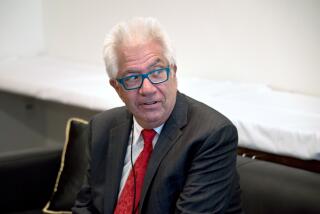William Trombley dies at 80; journalist reshaped The Times’ coverage of higher education
- Share via
William Trombley, a veteran journalist and education analyst who wrote for Life magazine and The Times during a five-decade career, died Sunday at a Davis hospital. He was 80.
Trombley had respiratory and other problems and died after a heart attack in the hospital, said his wife, Audrey.
At The Times, where he was a reporter for nearly 30 years starting in 1964, Trombley was known for reshaping the paper’s coverage of higher education, starting on the beat during a tumultuous period when the Free Speech Movement was roiling college campuses from California to New York.
He also covered crucial issues in lower education, from the desegregation lawsuits that brought busing to Los Angeles schools to prickly battles over bilingual education and textbooks.
“He had this incredible perspective that no one in the country could touch,” said Patrick Callan, president of the National Center for Public Policy and Higher Education, a San Jose think tank where Trombley founded and edited an influential quarterly called National CrossTalk after leaving The Times in 1992. “He was thought of as the dean . . . the best higher education writer over that period of time in the country.”
At National CrossTalk, Trombley wrote a series of in-depth articles on Kentucky’s efforts to reform its higher education system. He also wrote memorably about the obstacles facing the UC system’s newest campus at Merced, including its infringement on the habitat of several endangered varieties of fairy shrimp, “microscopic creatures that float on their backs, waving their 11 pairs of delicate legs” at frustrated UC officials.
Trombley was born in Buffalo, N.Y., on June 18, 1929. With a bachelor’s degree in history from Johns Hopkins University and a master’s in journalism from Columbia University, he launched an eight-year career at Life in 1953, working in the magazine’s New York and Chicago offices before heading its San Francisco bureau.
After brief stints as bureau chief at Hugh Hefner’s short-lived Show magazine and associate editor and contributing writer at the Saturday Evening Post, he joined The Times as an education writer and was immediately swept up in coverage of the student protests of the 1960s.
His stories documented the upheaval of the period, including the birth of the Free Speech Movement at UC Berkeley and the firing of UC President Clark Kerr.
He also profiled UCLA Chancellor Charles Young in 1970 when he faced pressure from Gov. Ronald Reagan and UC regents to fire Angela Davis, a philosophy professor and avowed communist who later went on trial for murder and was acquitted. “Bill attached himself to Young during the final days leading up to the regents meeting . . . and wrote a remarkable, intimate account of a university chancellor wrestling with a decision that could have cost him his job,” recalled Noel Greenwood, who covered education for The Times before he became Trombley’s editor.
Trombley was scholarly and, former colleague Robert Jones said, “a bit intimidating to people inside and outside the paper.” Jane V. Wellman, a former UC budget analyst who now heads a Washington nonprofit, recalled that “people in the regents’ office called him Trombley . . . as in, ‘Watch out, Trombley’s out there.’ He covered those meetings with gleeful intensity, forgiving them nothing if their work offended his idea of what a public governing board should do, which was to oversee and protect the public interest.”
He was also dry-witted, often leavening his stories with humorous observations. “Once upon a time a student could walk to any spot on campus in 10 minutes. Now he would need a personal monorail system,” he wrote in a 1965 article for The Times about how unwieldy growth had turned UC’s flagship campus at Berkeley into a “vast, perplexing, impersonal” institution and hotbed of student unrest.
He remained on the education beat for 11 years, switching to general assignment in 1975 and urban affairs in 1984. During his last three years at The Times, he reported from the Sacramento bureau. Whatever his official beat, he always returned to education stories and won a number of prizes, including the John Swett Award for Media Excellence from the California Teachers Assn. in 1983.
In addition to his wife of 55 years, Trombley is survived by daughters Patricia Trombley Ball of Montclair, N.J., and Suzanne Rice of Los Angeles, and two grandchildren.
More to Read
Start your day right
Sign up for Essential California for the L.A. Times biggest news, features and recommendations in your inbox six days a week.
You may occasionally receive promotional content from the Los Angeles Times.






